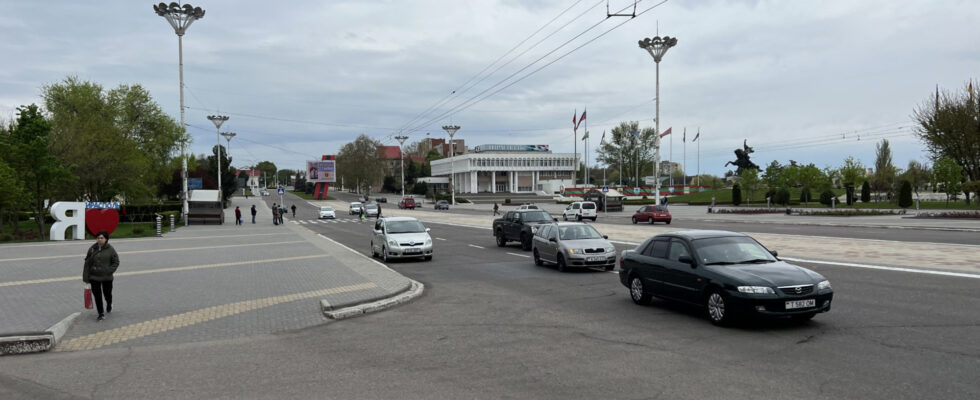The authorities of Transdniestria, a pro-Russian separatist region of Moldova, asked Russia on Wednesday for “protective measures” in the face of alleged “pressure” from Chisinau, against a backdrop of tensions exacerbated by the conflict in neighboring Ukraine. The deputies of this territory met in Tiraspol in an extraordinary congress, the first since 2006, and adopted a declaration. In this text, cited by Russian press agencies, the Russian Parliament is called upon to “implement measures to protect Transdniestria”, where “more than 220,000 Russian citizens” live, in the face of “increased pressure from of Moldova.
Moldovan government ‘rejects propaganda’ from Transdniestria
Moldova denounced on Wednesday the comments of the authorities of the pro-Russian separatist region of Transdniestria, who asked Russia for “protective measures” in the face of alleged “pressure” from Chisinau. The government “rejects the propaganda coming from Tiraspol”, Deputy Prime Minister Oleg Serebrian said on Telegram, asserting that the region benefits from “policies of peace, security and economic integration” as part of its ties with the ‘European Union.
“Unprecedented threats”, says Transdniestria
Transdniestria is facing “unprecedented threats of an economic, socio-humanitarian and military-political nature”, it is added in this declaration, without details on the desired aid. This request is reminiscent of a similar request from pro-Russian separatists in eastern Ukraine, in February 2022, which was one of the pretexts put forward by Vladimir Putin to launch a large-scale attack against Ukraine.
At the same time, Ukrainian President Volodymyr Zelensky called on the leaders of South-Eastern European countries, gathered in Albania for a summit, to provide increased support to his country, lacking ammunition, in the face of Russia which is nibbling ground on the front.
Accusations of “genocide”
A narrow strip of land between Moldova and Ukraine, Transdniestria seceded after a short war in 1992 against the Moldovan army. Russia still maintains 1,500 soldiers there, intended in particular to carry out a peacekeeping mission, according to official figures. But since the Russian assault of February 2022 against kyiv, conjectures have regularly resurfaced about a possible Russian attack from Transdniestria towards the large Ukrainian port city of Odessa, on the Black Sea.
Separatist authorities said Wednesday’s congress, attended by 620 MPs, was a reaction to Chisinau’s recent introduction of customs duties on imports from Transdniestria. In his speech, local president Vadim Krasnosselski, quoted by the media, assured that this territory was undergoing “a policy of genocide”, via economic, “physical”, legal and linguistic pressures.
In this resolution, MEPs also address the Organization for Security and Cooperation in Europe (OSCE), the European Parliament, the Red Cross and finally the UN General Secretariat, urging them to prevent ” provocations” which could lead to “an escalation of tensions”. The Moldovan government for its part declared earlier on Wednesday that “things seemed calm”, affirming that “there is no risk of escalation” despite this “new campaign aimed at creating hysteria within society “.
This is the first time that such a congress has taken place since 2006, when separatist deputies decided to organize a referendum on the integration of Transdniestria into Russia. During this election, the result of which was not internationally recognized, the local population voted 97.1% for its attachment to this country.
Fears of a widening of the Russia-Ukraine conflict resurface
Since the start of the Russian assault in Ukraine two years ago, fears of a widening of the conflict to Transdniestria have surfaced several times. Last year, the authorities of this self-proclaimed state notably accused kyiv of wanting to attack it after claiming to have foiled an attack in March that targeted its leaders. The Russian Defense Ministry again assured last week, without presenting evidence, that Ukraine was preparing an “armed provocation” against Transdniestria.
Officially counting 465,000 mainly Russian-speaking inhabitants, this small territory which runs along the Dniester is not recognized as a state by the international community, including Moscow. Chisinau and the European Union regularly criticize Russia for seeking to destabilize Moldova, formerly in its zone of influence but whose authorities are now resolutely turned towards Europe. In December 2023, the EU decided to open accession negotiations with both Ukraine and Moldova.
